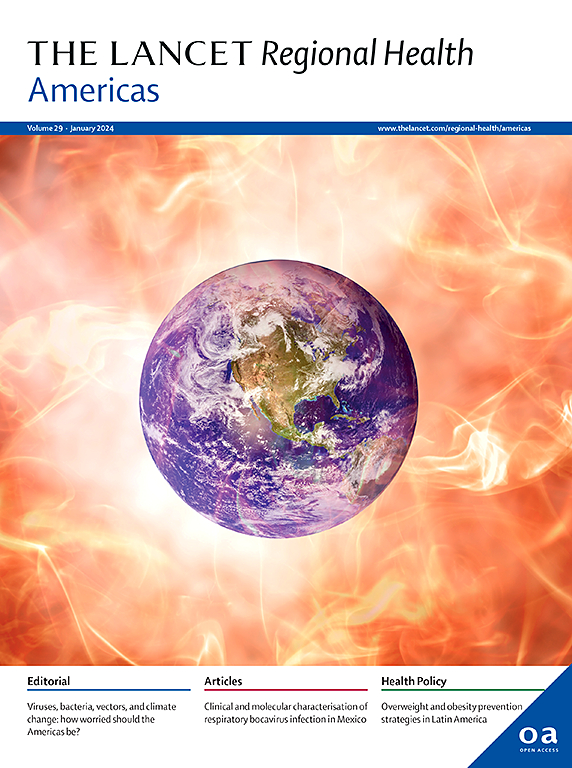旨在改善巴西社会经济贫困地区老年人阈值以下抑郁症状的自助式移动信息干预(PRODIGITAL):一项务实的双臂随机对照试验
IF 7
Q1 HEALTH CARE SCIENCES & SERVICES
引用次数: 0
摘要
背景阈值以下抑郁症是重度抑郁症的一个风险因素,与发病率和死亡率的增加有关,尤其是在老年人中。有新的证据表明,数字干预(包括自助干预)可以减轻抑郁症状。我们的目的是评估手机短信干预在减少巴西老年人阈值以下抑郁症状方面的效果。方法PRODIGITAL 是一项单盲、双臂、单独随机对照试验,在巴西瓜鲁柳斯市的 46 家初级保健诊所进行。根据随机排序的名单,60 岁以上的老年人通过电话接受了筛查评估。那些出现失乐症和/或情绪低落(患者健康问卷(PHQ)-2≥1),且随后在 PHQ-9 中得分介于 5 和 9 之间的人被邀请参加。干预组接受 "Viva Vida "数字自助干预,包括通过 WhatsApp 自动发送的多媒体信息。在为期六周的时间里,干预组自动发送了 48 条基于心理教育和行为激活的视听信息。对照组只收到一条包含抑郁症相关信息的信息。主要结果是治疗组之间在三个月随访时 PHQ-9 平均得分的差异。所有主要分析均根据分配给治疗组的数据进行。该试验已在ReBEC注册,编号为RBR-6c7ghfd.研究结果参与者招募时间为2021年9月8日至2022年8月19日。在454名参与者中,223人被随机分配到干预组,231人被随机分配到对照组。参与者的平均年龄为 65.3 岁(标准差 5.0),64.0%(n = 292)为女性。共有 385 人(84.8%)完成了为期三个月的随访评估;治疗组之间的 PHQ-9 平均得分无差异(调整后差异:-0.61;95% CI:-1.75,0.53;P = 0.29)。我们需要进一步研究,以了解这种自助干预对这一人群无效的原因,并探索如何调整这种干预以实现这一目标。本文章由计算机程序翻译,如有差异,请以英文原文为准。
A self-help mobile messaging intervention to improve subthreshold depressive symptoms among older adults in a socioeconomically deprived region of Brazil (PRODIGITAL): a pragmatic, two-arm randomised controlled trial
Background
Subthreshold depression is a risk factor for major depression and is associated with increased morbidity and mortality, especially in older adults. There is emerging evidence that digital interventions, including self-help interventions, may reduce depressive symptoms. We aimed to evaluate the effectiveness of a mobile messaging intervention at reducing subthreshold depressive symptoms among older adults in Brazil.
Methods
PRODIGITAL was a single blind, two-arm, individually randomised controlled trial conducted in 46 primary care clinics in the city of Guarulhos, Brazil. Individuals aged 60+ years were contacted by phone following a randomly ordered list for a screening assessment. Those who presented with anhedonia and/or depressed mood (Patient Health Questionnaire (PHQ)-2≥1), and who subsequently scored between 5 and 9 on the PHQ-9 were invited to participate. The intervention arm received the ‘Viva Vida’ digital self-help intervention consisting of automated multi-media messages sent via WhatsApp. Forty-eight audio and visual messages based on psychoeducation and behavioural activation were automatically delivered over six weeks. The control arm received a single message containing information about depression. The primary outcome was the difference in mean PHQ-9 scores between treatment arms at the three-month follow-up. All primary analyses were performed according to allocated arm with imputed data. The trial is registered with ReBEC, RBR-6c7ghfd.
Findings
Participants were recruited between 8 September 2021 and 19 August 2022. Of the 454 participants enrolled, 223 were randomised to the intervention arm, 231 to the control arm. Participants’ mean age was 65.3 years (SD 5.0) and 64.0% (n = 292) were female. A total of 385 (84.8%) completed the three-month follow-up assessment; no difference in mean PHQ-9 scores between the treatment arms was observed (adjusted difference: −0.61; 95% CI: −1.75, 0.53; p = 0.29).
Interpretation
These results demonstrate that the Viva Vida digital self-help intervention did not help to improve subthreshold depressive symptoms amongst older adults. Further research is needed to understand why this self-help intervention was not effective in this population, and to explore how it might be adapted to achieve this goal.
Funding
São Paulo Research Foundation and UK Joint Global Health Trials.
求助全文
通过发布文献求助,成功后即可免费获取论文全文。
去求助
来源期刊

Lancet Regional Health-Americas
Multiple-
CiteScore
8.00
自引率
0.00%
发文量
0
期刊介绍:
The Lancet Regional Health – Americas, an open-access journal, contributes to The Lancet's global initiative by focusing on health-care quality and access in the Americas. It aims to advance clinical practice and health policy in the region, promoting better health outcomes. The journal publishes high-quality original research advocating change or shedding light on clinical practice and health policy. It welcomes submissions on various regional health topics, including infectious diseases, non-communicable diseases, child and adolescent health, maternal and reproductive health, emergency care, health policy, and health equity.
 求助内容:
求助内容: 应助结果提醒方式:
应助结果提醒方式:


